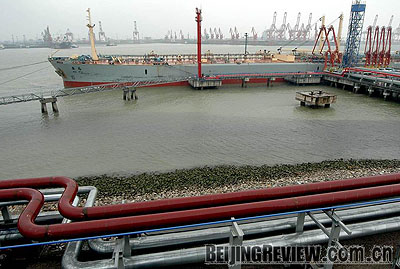|

Numbers of the Week
2.55 million tons
China imported 2.55 million tons of refined oil valued at $2.28 billion in September, the lowest monthly amount of oil imported this year.
50 billion yuan
A nuclear power plant with an investment of 50 billion yuan ($7.32 billion) will be built in Wuhu, Anhui Province, the first one of its kind in the area.
TO THE POINT: The global financial market turmoil has claimed a handful of financial giants and taken its toll on emerging markets, including China. The country's sovereign wealth fund management company has been ill-fated since its establishment a year ago and has lost billions of dollars because of the U.S. financial institution debacle. Domestic mutual funds have lost about one third of their value since early this year and show no signs of recovery. The government asked state-owned enterprises to reduce their investments in volatile capital markets to avoid further losses at a time when financing is tight. The country's trade surplus unexpectedly jumped in September, largely thanks to shrinking imports, although the level of exports remained stable from the previous month.
By LIU YUNYUN
Money Supply Slowdown
The central bank's previous efforts to check the oversupply of money, one of the culprits of the country's high inflation, started taking effect as of the middle of the year.
The People's Bank of China, the central bank, said the financial markets were stable in September. Throughout the month, the M2-a broad measure of money supply that includes cash plus all deposits-grew by 15.29 percent to 45 trillion yuan ($6.6 trillion) over the same period last year.
The global economic recession forced China to drop its stringent monetary policy adopted at the end of last year after the M2 supply growth rate was down four months in a row. This suggests that monetary conditions have been relatively tight and helps explain why the central bank has cut interest rates and the reserve requirement ratio twice since mid-September.
Central bank figures also indicate that citizens have been more willing to save their money in fixed-interest accounts after experiencing stock market losses. Experts expect the central bank to cut interest rates again to inject money into the economy.
CIC's Predicament
The unfolding U.S. financial crisis smashed foreign investors' dream of profiting from the world's most powerful economy. China Investment Corp. (CIC), the government entity responsible for investing and adding value to the country's $1 trillion-plus foreign reserve, has suffered some blows from the deepening U.S. credit crunch.
Before the outbreak of the crisis, CIC poured $8 billion into Blackstone Group Corp., an American private equity firm, and Morgan Stanley Group Inc. But to date, it has lost $6.1 billion on the companies' book values because of their plunging share prices.
The nightmare wasn't only in the stock market. The money market, a harbor for risks in the volatile financial arena, became riskier. The Reserve Primary Fund (RPF), the oldest money market fund in the United States, said it was no longer allowing withdrawals because its share price had fallen below $1 and had "broke the buck" in mid-September. Documents from the U.S. Securities and Exchange Commission showed Stable Investment, an investment unit under CIC, was RPF's biggest investor with up to $5.4 billion in the fund.
CIC was set up in September 2007 when the mainland economy was growing at a stunning pace with ballooning foreign reserves, but it chose to tap the global markets at a wrong time. Tao Dong, Chief Economist of Asia-Pacific region for Credit Suisse First Boston (Hong Kong ) Ltd., told Beijing Review that CIC might pay a high price for its immaturity, but in the long run, its investments would pay off when the markets recovered.
Fund Managers' Woes
The freefall in the mainland stock markets caused a big headache for fund managers who operate the nation's 300 open-end mutual funds.
| 